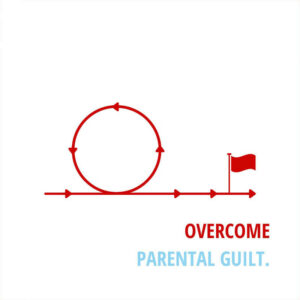Even in the best-case scenario and even with super loving parents, parents cannot always be available for all of the child’s needs. This is called ‘good enough parenting’. Which means being attuned and supportive parents who are human – parents who miss the mark on occasion, and miss cues regarding their children’s needs. This ‘good enough parenting’, as it turns out, is actually the optimal type of parenting, as it teaches children that although their cup is fairly full, the world is not always going to respond to them the way they want.
Children need to gently learn that their needs are not always met and they are not the centre of the universe. This prepares children for the real world, which is far from consistently and sensitively responsive. It also helps children to learn ‘frustration tolerance’ – that is, they learn to tolerate and self-soothe when their needs have been frustrated. From this they can learn the skill of patience. You don’t need to be a perfect parent, you just need to be a ‘good enough’ parent, but this is still a pretty high bar.
I am always amused by the inevitable question by new clients: ‘Do you have kids?’ Despite my qualifications and experience, this is where I get my credibility. I pass this test when I say yes, then with more questioning, I explain that I have five kids (7, 9, 15, 17 & 20). Credibility grows. Five boys they then hear… I’m in! I understand this. Parenting is one of those things you can only comprehend from the inside, the marathon that it is, with profound joy, meaning, frustration, and fear all wrapped up together.
The parent
you are the nurturer,
the leader
and the protector.
It is essential that we are reflective and purposeful in our parenting. Someone who is good at ‘adulting’ is miles ahead in terms of being set up for good parenting. If you’re not switched on with your own mental health, you could put your issues on your child. Many parents yell at their children, and when at breaking point, say things they regret, and know will harm their children. Many parents hit their kids. This is truly damaging, as the primary lesson that hitting teaches is fear and violence. We end up with kids who become increasingly fearful in their response to their world and who reach for hitting as their coping mechanism. They learn to copy their parents, and then the kids get in trouble for hitting others! As role models we can easily become our kids’ number one cause of harm.
Our parenting role is a massive responsibility. We can not emotionally guilt them or emotionally intimidate children and we cannot take their child and teenage antics personally. When our munchkin is misbehaving we have to separate them from their behaviour. It is bad behaviour and poor choices on their part, it is not that we have a bad child, so please never, never, never say ‘bad girl’ or ‘bad boy’. This is worse than calling them names or criticising them. This is you saying that their person – their core – is bad. If you want to shred their self-esteem, this is how you would do it.
I don’t want to create parental guilt here, when we hold ourselves up an adequate level of responsibility and accountability, we have no need for parental guilt, just pride in parenting. I would actually argue that parental guilt is perhaps one of our strongest emotions. It dangerously has us going in circles, berating ourselves and making the situation worse. I am all about parental action. If it’s broken, fix it; don’t just sit in a puddle feeling sorry for yourself. The key is insight and ownership. By learning our patterns, owning them and communicating them to our children, we can repair or rebuild bridges in our relationships with our kids. Nothing can be strengthened and repaired until we have been able to identify and address the damage.
Our goal is to provide a stable, nurturing family environment. This means not being reactive during the hard times. We want our children to feel safe to come to us during the tough, vulnerable and humiliating chapters in life. Why would they however if we have previously become emotionally reactive when we have been disappointed by their behaviour? Plenty of parents have told me ‘My kids can talk to me about anything.’ They are speaking about their ideal. Then their kids tell me in session, ‘No way. Mum or Dad would crack it at me, they’re the last person I’d talk to.’ When we are the parents, we are the backbone of our family, we are the leaders. We need high standards for ourselves and we need to earn the honour of being their role models.
So the punchline is, while we do not need to be perfect, we need to also hold ourselves up to high account to not do harm either. We need to be sensitive, responsive but still fallible parents. Aim high, just not to the moon!



Subscribe To Our Newsletter
Join our mailing list to receive Psych wisdom, advice and encouragement once a month.
"The Skills we need are not just common sense, we need to learn them from somewhere"
You have Successfully Subscribed!